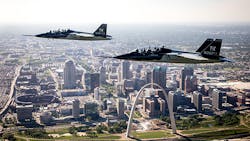Boeing Defense to Assemble T-X Jets in St. Louis
Boeing Defense, Space & Security has committed to assemble its version of the T-X Air Force training jet at its St. Louis, Mo., plant, if it is successful in its bid for that Pentagon contract. The award would be worth a reported $16 billion to Boeing, and would support about 1,800 jobs in the St. Louis region, the OEM indicated.
Missouri state and federal elected officials applauded Boeing’s announcement. Presently, the St. Louis plant assembles the F-15 jet fighter and the F/A-18 aircraft used by the U.S. Navy and U.S. Marine Corps, though those programs are expected to decline in importance as the Pentagon incorporates the F-35 Joint Strike Fighter (a Lockheed Martin product) across the defense forces.
The T-X program was initiated by the U.S. Dept. of Defense in 2013 in order to select a new training jet for the U.S. Air Force, as a replacement for the Northrop T-38 Talon. The average age of the aircraft in that training fleet is now more than 50 years old. About 350 aircraft are expected to be ordered to replace the T-38, but further purchases could push the overall purchase above 1,000 jets.
Boeing’s proposed T-X jet is a single-engine, twin-tail aircraft unveiled last year. Two of the aircraft have been built and the initial flights were completed in December 2016.
It’s expected that the Pentagon will award the T-X contract later this year, with initial operating capability for the new training jets set for 2024.
The T-X program had been expected to begin this year, but the constraints in U.S. defense spending over recent years have advanced the program’s initial operating capability date. In addition to Boeing, Lockheed Martin will submit a bid on the project in collaboration with Korea Aerospace Industries. It has said it would build its T-X entry (based on the current T-50A) in Greenville, S.C.
An Italian firm, Leonardo SpA also is expected to bid, and would build a new plant in Tuskegee, Ala. Northrop Grumman Corp. has decided against bidding on the program.
Boeing’s proposal stands to be the only bid that is entirely U.S.-centered. The DOD guidelines for the proposals require the winning bidder to assemble training jets in the U.S., though parts may be sourced from supply chains worldwide.
Boeing previously reported that the first two new, purpose-built T-X aircraft have demonstrated its design’s “low-risk, performance and repeatability in manufacturing.”
“Our highly-skilled St. Louis workforce designed, assembled, and brought Boeing T-X to life and they continue to define the future, not just for our company, but for our customers and the global aerospace industry,” stated Shelley Lavender, St. Louis senior executive and president of Boeing Military Aircraft.
About the Author
Robert Brooks
Content Director
Robert Brooks has been a business-to-business reporter, writer, editor, and columnist for more than 20 years, specializing in the primary metal and basic manufacturing industries.
